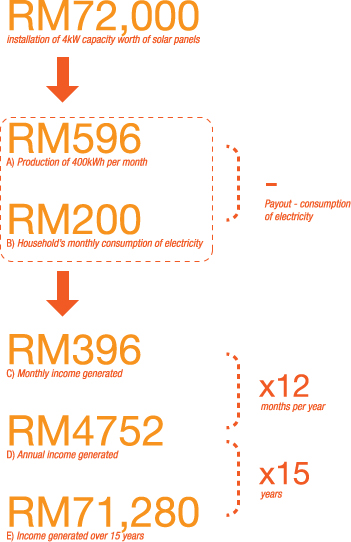by Gan Pei Ling / 18 April 2011 © The Nut Graph
 Have you ever wanted to install solar panels at your home, but couldn’t afford the capital cost? Once the Renewable Energy Act comes into force, this dream could become a reality.
Have you ever wanted to install solar panels at your home, but couldn’t afford the capital cost? Once the Renewable Energy Act comes into force, this dream could become a reality.
Passed by the Dewan Rakyat on 4 April 2011, the Act will allow individuals to sell electricity produced from renewable sources like solar photovoltaic at a higher rate than traditional power producers to Tenaga Nasional Berhad (TNB).
This incentive is expected to boost renewable energy industries and its current electricity generation share in the country from under one percent to 11% by 2020. But how will this work? Where will the funds come from? And will home-owning Malaysians be willing to be part of the new system?
Feed-in-tariff
Following the footsteps of pioneering country Germany and our neighbours Thailand and the Philippines, Malaysia will be implementing the feed-in-tariff (FIT) system.
Electricity produced from four types of sources — solar panels, small hydro, biogas and biomass — will benefit from the FIT mechanism under the Renewable Energy Act.
Among these four, residential homes would benefit most from solar photovoltaic as a renewable energy source.
The other three sources — small hydro, biogas and biomass, would be more suitable for implementation by businesses as the capital expenditure could amount to millions. The table below demonstrates the different costs involved in setting up the different sources.
| Solar PV | Small Hydro | Biomass | Biogas | |
| Installed capacity | 6kW | 10MW | 10MW | 4MW |
| Expenditure | RM90,000 | RM90mil | RM90mil | RM40mil |
Source: Adopted from Malaysia Building Integrated Photovoltaic Technology Application Project leader Ahmad Hadri Haris’s March 2011 presentation
Going solar at home
A normal household would usually need about 4kW capacity worth of solar panels, which would cost around RM72,000 to install. That’s about the price of a brand new Toyota Vios.
Too expensive to go green? Think again. Your Toyota Vios’s commercial value will be depreciating at a rate of about 10% a year, but not the income that you would be receiving from installing solar panels on your roof.
Under the FIT system, TNB will sign a 21-year agreement with households and pay at least RM1.49 per kWh electricity generated. Assuming production of 400kWh per month, this would amount to a payout of RM596 per month.
If a household’s electricity bill is RM200 a month, there would still be a steady monthly income of RM396 for the next 21 years, which could be used to repay the loan taken to install the solar panels. The 4kW system would pay for itself and start turning a profit within 15 years.
It is also worth highlighting that one will get paid more under the FIT mechanism if locally-manufactured or assembly solar inverters or photovoltaic modules are used, and/or used as part of building materials.
Granted, the scheme doesn’t bring about huge profits all at once, but I think most middle-class families would now be able to afford to install solar panels should they wish to.
However, it should also be noted that there will be an annual degression rate of 8% for the solar photovoltaic system. In other words, the later one joins the FIT scheme, the lower the FIT rate one will receive. This is based on the assumption that the cost of solar panels would go down once more people adopt it.
The degression rate will be reviewed every three years by the soon-to-be-established Sustainable Energy Development Authority to ensure the rates remain reasonable.
Making renewable energy commercially-viable
Residential homes aside, commercial renewable energy producers are the ones who are set to benefit the most from the FIT mechanism and who seem most excited about the new scheme.
Prior to the Act, TNB paid the same rate of RM0.21per kWh for energy whether or not it was produced from environmentally-friendly resources or from fossil fuel.
Under the FIT scheme, biogas and biomass electricity producers will finally be rewarded for their pioneering efforts and get paid at least 28% more than fossil fuel producers, as shown in the table below.
| Biogas | Basic FIT rate (RM) | Biomass | Basic FIT rate (RM) |
| Up to 4MW | 0.32 | Up to 10MW | 0.31 |
| Up to 10MW | 0.30 | Up to 20MW | 0.29 |
| Up to 30MW | 0.28 | Up to 30MW | 0.27 |
Source: Renewable Energy Bill
They will be signing a 16-year contract with TNB and enjoy the same competitive rates throughout the period.
In addition, those who use locally-manufactured or assembled gas engine or gastification technology will enjoy a bonus of one sen on top of their basic FIT rate.
Biogas electricity producers who use landfill or sewage gas as a fuel source will further enjoy a bonus of eight sen. Biomass players will enjoy an additional 10 sen for using municipal solid waste as their fuel source.
Already, a 26ha renewable energy park is being built on a remediated landfill in Pajam, Nilai, which would consist of a 2MW biogas plant and 8MW solar power facility, and is expected to generate RM12mil gross national income in 2020.
Meanwhile, small hydro producers enjoy less incentive at RM0.23 to RM0.24 per kWh but their contract with TNB will last for 21 years under the FIT mechanism.
Renewable Energy Fund
The government or TNB will not be forking out its own money to pay the higher FIT rates. The funds will come from consumers. There will be a one percent hike in the current electricity tariff, expected in 2012, the revenue of which will be used to finance the Renewable Energy Fund needed to finance the FIT scheme.
In other words, if your electricity bill is RM200, you will be paying an additional RM2 and that amount will go into the Renewable Energy Fund.
However, the FIT mechanism is not meant to last forever.
It is expected that the cost of producing renewable energy will eventually be cheaper than electricity currently produced by fossil fuel producers. This is also given the fact that current energy prices do not reflect the true cost of production due to subsidies for natural gas and the government-controlled electricity tariff. Once the cost of renewable energy drops below fossil fuel energy, the Renewable Energy Fund will cease to exist.
At that point, TNB would be able to directly purchase power from renewable energy producers as it would be cheaper than electricity produced from fossil fuel like gas and coal.
In the meantime, for the FIT mechanism to be implemented successfully, the government will need to widely publicise the new scheme to home owners and commercial producers and for many to participate in it. Only then will Malaysia be able to increase its renewable energy production to meet and hopefully, surpass its target of 11% by 2020. If Malaysia can push its renewable energy industries forward and make them cost-effective, not only would we be reducing our reliance on fossil fuel and carbon emission, we could even drop the idea of going nuclear, too.
Gan Pei Ling is looking forward to installing solar panels in her own home.




